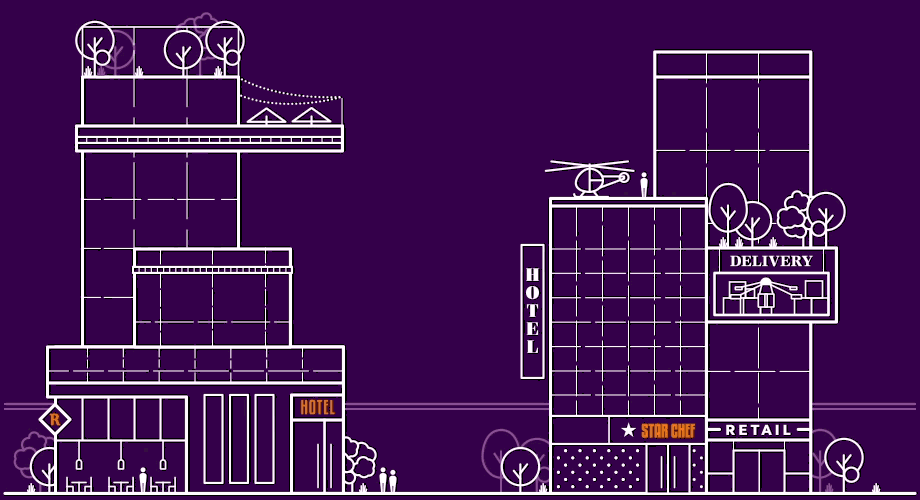Hotel of the
Future
As our world gets smaller, connectivity is driving almost every industry, including hospitality and travel. Tapping into the need for connection, experience and social interaction will give hotel brands a leg-up in the battle for survival.
Star Chefs and Artisanal Everything
The most sought-after beverage and food options in the Hotel of the Future will have four ambitions: to be sustainable, social, authentic and memorable. Good design is the bedrock of all four.
- We can look forward to hotels partnering with local community restaurants and chefs and more farm-to-table meals, perhaps even from the hotel’s own garden.
- It’s not all about the food. 31% of people are more likely to try a new drink in a hotel compared to 26% in casual restaurants or bars. Expect to see interesting new craft cocktails with plenty of local ingredients.
- Dining out has always been a social activity, but as the hospitality industry moves into the future, social will take on a whole new meaning. From communal tables to community pop-up restaurants and food halls, diners will meet new people and experience new cultures.
Meet Better
Despite tech advancements that let us video conference with colleagues on another continent, nothing compares to the face-to-face meeting. The hotel of the future will cater to the changing needs of road warriors with enhanced tech, efficient programming and smarter services.
- Meetings are boring. 46% of employees would rather do any other unpleasant activity than sit in a status meeting. Future hotel meeting spaces will likely be found in non-traditional or blended spaces like an indoor/outdoor courtyard or a coffee shop/classroom.
- In-house event planners will be the new curators of smarter, more authentic experiences and we’ll see more branded partnerships with outside venues outside for meetings and events.
- Location reigns and hotels will leverage a city’s unique brand for destination meetings. Just imagine having a pop-up meeting pod on the lawn of the Eiffel Tower and you get the idea.
- Tech’s role will continue to grow, starting with smarter booking. Digital platforms will make booking a meeting space (and anything else) seamless, and on-the-fly competitive price changes will decrease vacancy rates. Once booked, these meeting rooms will be equipped with state-of-the-art tech that covers everything from holographic presentations to virtual reality.
Upstairs, Downstairs and Robots
Turning a profit while competing with house-sharing websites is a fairly new conundrum for hotel brands. A highly-efficient back-of-house, along with automation where it makes sense, will help hoteliers save money, maximize staff and provide smooth service.
- Robots, apps and digital integration will play a big role, but it’s not about eliminating guest interaction with staff—it’s about elevating customer service. Finding a balance between in-person communication and seamless mobile requests keeps guests and staff happy.
- Convenience is king. At home, apps can order dinner, have someone pick up laundry or schedule a house cleaning—why would guests expect less from a hotel? Future hotel guests will schedule room service, turn-down service and laundry, only when they want it through an app, helping hotel operators save time, money and manpower.
- The gig economy is alive and well with 40% of the workforce expected to be consultant-based in the next five years. Hospitality is embracing this trend, too, within their own workforces and in the amenities they offer for entrepreneurs and small business owners.
- And speaking of the hospitality workforce, hotels will need new talent to compete in our data-driven world—data scientists, sensor specialists and social media experts for mechanical engineers spring to mind.
- With a premium on desirable urban locations, the mantra will be “reduce space and cost, maximize room count.” Automated parking, requiring less space per car, will help. Dual-branded hotels that share amenities will reduce building footprint and enhance guest experience.
The Green Light
Hotels are some of the biggest energy hogs on the grid. We’ve all seen the requests to reuse our hotel bath towels or the lights that only turn on when guests are in the room, but things are about to get green in a big way.
- There are already a handful of net zero hotels out there, but soon we’ll see “energy positive” brands going beyond solar panels and wind turbines—the highest tech buildings will clean the air and soil and actually make the environment better.
- In the shorter term, modular construction is becoming a mainstay of multi-family and hotel design. Pre-fab units lower costs by creating less waste. Plus, the ability to easily implement stringent quality control processes make them extra energy efficient.
From the Connected Room to the Social Lobby
In the future, guest rooms will no longer be one-size-fits-all. Technology and innovative design will provide flexible spaces tailored to guests’ preferences.
- The guestroom of the future has everything it needs and nothing it doesn’t. Rooms will be smaller with less clutter and smaller furniture, but provide everything from local flair to environmental control to virtual reality.
- Guestrooms will be all about customization. Future guests can expect to be able to control everything in their rooms including amenities, services and even artwork.
- Lobby spaces are becoming the perfect mix of business and leisure. Hotel public spaces will attract guests who are looking to connect with other guests, as well as the wider community.





